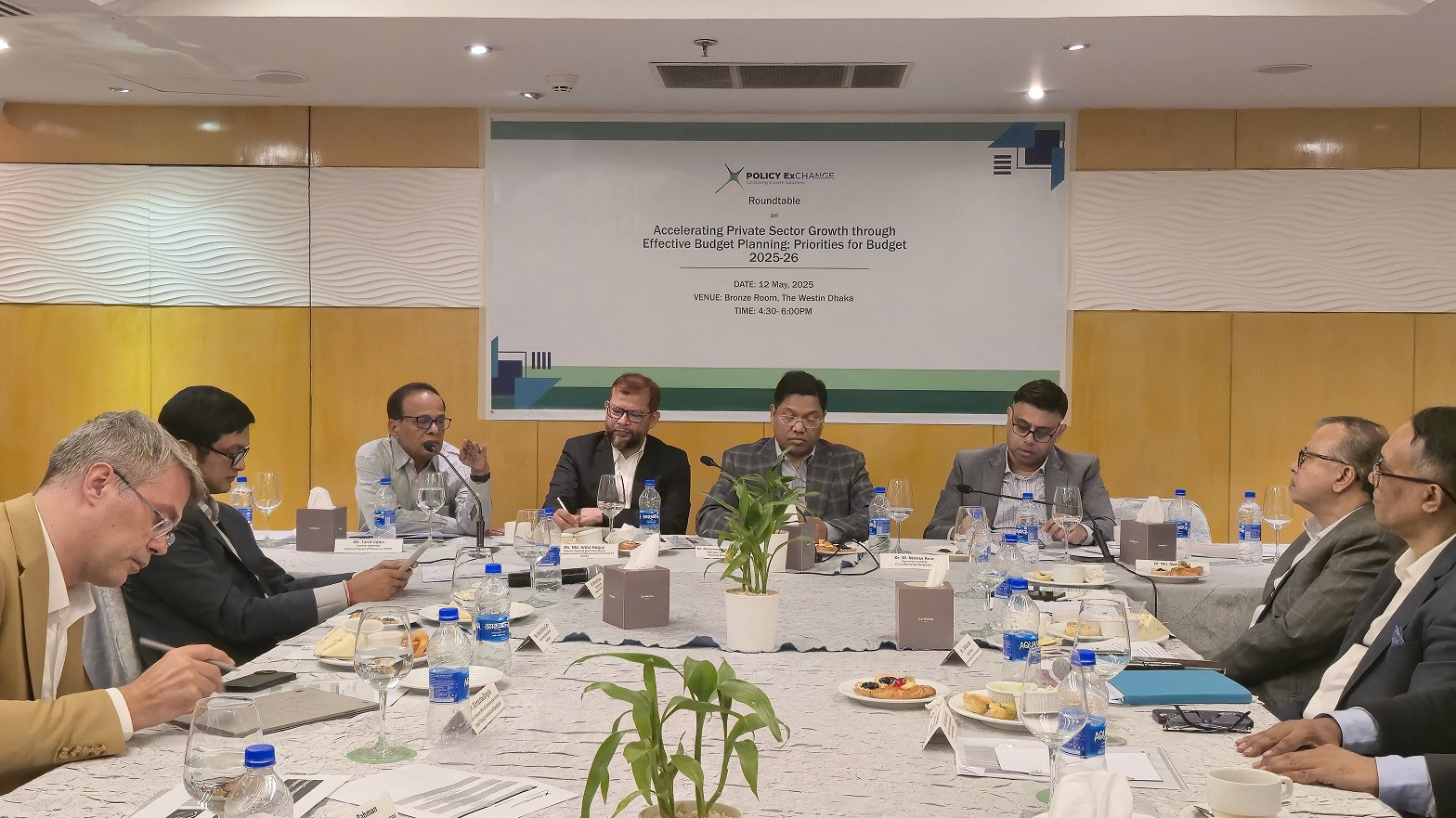03/02/2026

Policy Exchange hosts high-level roundtable on budget 2025–26
Staff Correspondent | Published: 2025-05-14 19:22:22

Policy Exchange Bangladesh convened a high-level roundtable titled “Accelerating Private Sector Growth Through Effective Budget Planning: Priorities for Budget 2025–26”, bringing together key stakeholders from government agencies, private industry, and economic think tanks to chart a course for inclusive and sustainable growth ahead of the upcoming fiscal budget.
Chaired and moderated by Dr M Masrur Reaz, Chairman and CEO of Policy Exchange, the event engaged senior representatives from the National Board of Revenue (NBR), Bangladesh Investment Development Authority (BIDA), and leading sectors including FMCG, tobacco, RMG, agriculture, telecommunications, and foreign chambers of commerce.
The discussion held in the capital on Wednesday aimed to realign fiscal priorities, enhance domestic resource mobilisation, and accelerate private investment.
Mohammad Belal Hossain Chowdhury, Member (VAT Implementation & IT), NBR, opened the dialogue by emphasising automation to curb harassment and improve compliance.
“We are working on massive automation. But businesses must come forward with intelligence on illicit trade. Collaboration is key,” he noted.
Former NBR Member and current Reform Committee Member Farid Uddin highlighted deep-rooted structural challenges.
“Eighty per cent of our tax base remains indirect—unacceptable for a developing economy. Radical reforms and strong political will are needed to address distortions such as excessive TDS and a fragmented VAT system,” he argued.
Md Ariful Hoque, Director General of BIDA, called for synchronised reforms across land, energy, and taxation policies.
“Revenue and investment are two sides of the same coin. Automation alone won't solve our challenges—we need a shift in bureaucratic mindset and consistent policy delivery,” he remarked.
Private sector leaders echoed the need for responsive fiscal policies. Gintautas Dirgela, Director of Corporate Affairs & Communications at Japan Tobacco International Bangladesh, endorsed structured public-private dialogue.
“We fully support the Interim Government’s revenue mobilisation goals. Predictable, sustainable tax policies help grow revenue without fuelling the black market,” he said.
Highlighting the RMG sector's urgency, Mohammed Zahidullah, Chief Sustainability Officer of DBL Group, warned, “Energy shortages and carbon taxes threaten our competitiveness. Without green energy partnerships and tax breaks for sustainable factories, orders may shift to Vietnam or India.”
Telecom taxation also came under scrutiny. Hossain Sadat, Senior Director of Corporate Affairs at Grameenphone, said, “Consumers lose 39 percent in taxes when topping up BDT100. This discourages digital access. Rationalising VAT and supplementary duty is essential.”
Nestlé Bangladesh’s Senior Taxation Manager Rejaul Karim advocated for reduced business costs amid inflationary pressures.
“Simplifying VAT returns and lowering corporate tax rates can restore consumer demand and fuel growth,” he asserted.
Dr Ashikur Rahman, Principal Economist at the Policy Research Institute of Bangladesh, criticised the long-standing fiscal inertia.
“We’ve debated these same issues for a decade. Without bold reform, fiscal deficits will continue to crowd out private investment,” he cautioned.
Accounting expert Snehasish Barua, Managing Partner at Snehasish Mahmud & Co. (SMAC), called for tax equity.
“The same tax rules cannot apply to SMEs and multinationals. Separate SME regimes and lower TDS rates will reward compliance,” he said.
T.I.M. Nurul Kabir, Executive Director of the Foreign Investors Chamber of Commerce and Industries (FICCI), stressed the importance of consistency.
“Investors need predictability. Bangladesh must abandon ad hoc policymaking as we near LDC graduation,” he urged.
Concluding the session, Dr M Masrur Reaz reaffirmed Policy Exchange’s role in translating dialogue into action.
“This is only the beginning. We’ll compile and share key recommendations with NBR and BIDA to help shape the FY 2025–26 budget,” he said.
Key Sectoral Recommendations:
Agri-business and FMCG: Integrate informal trade into the formal tax system and address compliance gaps.
Telecommunications: Reduce tax burdens to foster digital inclusion and drive long-term growth.
Tobacco: Maintain current tax levels and floor prices to prevent illicit trade while reforming structures to ensure sustained revenue.
Editor & Publisher : Md. Motiur Rahman
Pritam-Zaman Tower, Level 03, Suite No: 401/A, 37/2 Bir Protik Gazi Dastagir Road, Purana Palton, Dhaka-1000
Cell : (+88) 01706 666 716, (+88) 01711 145 898, Phone: +88 02-41051180-81